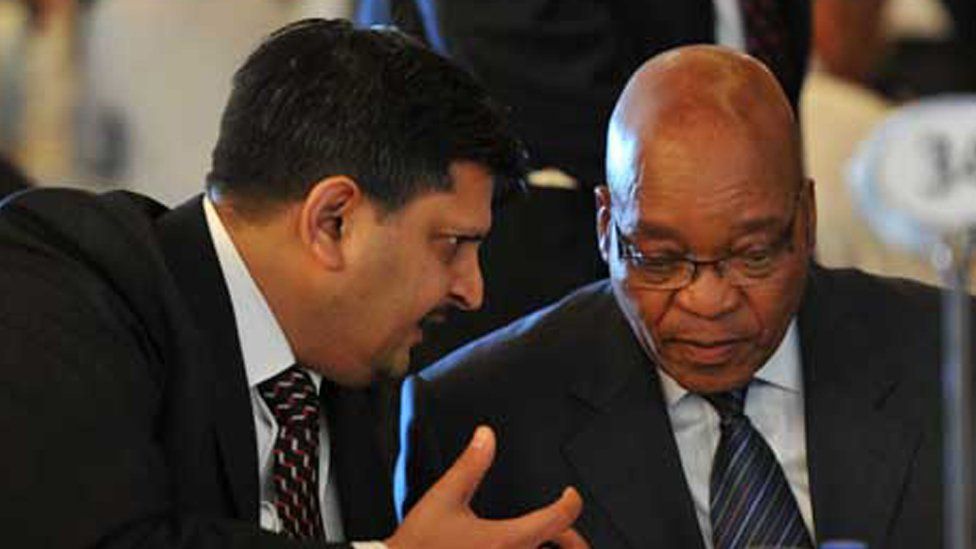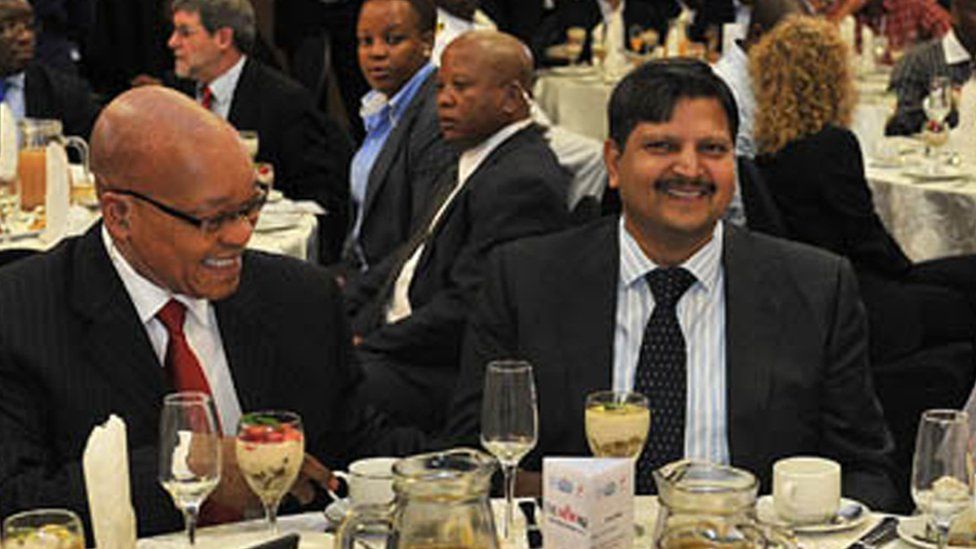



Atul Gupta with South African president Jacob Zuma in 2011
Atul and Rajesh Gupta are accused in South Africa of profiting from their close links with former president Jacob Zuma and exerting unfair influence.
Extradition talks are taking place with the UAE, South African officials say.
The brothers fled South Africa after a judicial commission began probing their involvement in corruption in 2018.
They are accused of paying financial bribes in order to win lucrative state contracts and influence powerful government appointments.
The family moved from India to South Africa in 1993. They also face accusations of money laundering in India, where tax officials raided properties belonging to them in 2018 in multiple cities, including their company office in capital Delhi.
Many of the most serious corruption allegations levelled against the Indian-born brothers focus on their relationship with Jacob Zuma, who was president of South Africa from 2009 until he was forced to step down amid a storm of corruption allegations nine years later.
The Gupta family is accused of using their close links with Mr Zuma to wield enormous political power across all levels of South African government - winning business contracts, influencing high-profile government appointments and misappropriating state funds.
Mr Zuma and the Guptas deny any wrongdoing.
After the brothers fled the country, South Africa negotiated an extradition treaty with the UAE in 2021.
President Cyril Ramaphosa's government has said it hoped the agreement would lead to the return of the Guptas to face charges, but it was not immediately clear following the arrests whether the brothers will return to South Africa.
The Gupta family became so closely linked with Mr Zuma that a joint term was even coined for them - the Zuptas.
One of Mr Zuma's wives, as well as a son and daughter, had positions working in senior roles for Gupta-controlled companies.
Many of the companies in the Gupta portfolio profited from lucrative contracts with government departments and state-owned corporations - where public officials say they were directly instructed by the family to take decisions that would advance the brothers' business interests.
It is alleged that compliance was rewarded with money and promotion, while disobedience was punished with dismissal.
The list of public bodies accused of having been "captured" is extensive - the ministries of finance, natural resources and public enterprises, as well as agencies responsible for tax collection and communications, the state broadcaster SABC, the national carrier, South African Airways, the state-owned rail-freight operator and the energy giant Eskom - one of the largest utility companies on the planet.
A four-year investigation later published by the country's top judge concluded that the wealthy brothers had become deeply embedded in the highest levels of government and Mr Zuma's ruling African National Congress (ANC) party.
Reports published this year by investigators accuse the brothers of being linked to racketeering activity through the procurement of rail, ports and pipeline infrastructure.
Its authors also concluded that Mr Zuma "would do anything that the Guptas wanted him to do for them".
Last year Mr Zuma was imprisoned for 15 months for refusing to testify before the same investigators. He was released on parole after serving two months of his sentence in jail.

South African President Jacob Zuma sits with Atul Gupta in 2012
Ajay, Atul and Rajesh Gupta moved to South Africa from the Indian state of Uttar Pradesh in 1993, just after the fall of apartheid.
It is said that when Atul arrived to set up the family business Sahara Computers, he was amazed by the lack of red tape.
They grew the company to employ more than 10,000 people in South Africa, also developing financial interests in the mining, air travel, energy, technology and media sectors.
Atul Gupta said he met Mr Zuma before he became president "when he was a guest in one of Sahara's annual functions".
-- Courtesy of BBC News